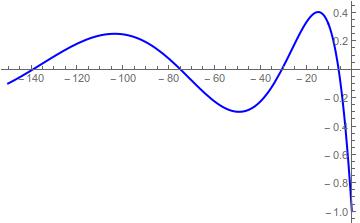This problem can be solved symbolically, although perhaps not with DEigensystem. Instead, begin with DSolve.
s = DSolveValue[{2 x y''''[x] + 4 y'''[x] == lamda y''[x], y[0] == 0,
y'[1/2] == 0, y''[1/2] == lamda y[1/2]}, y[x], x] // FullSimplify
(* (16 C[2] (BesselI[0, Sqrt[lamda]] (-1 + 2 x + Sqrt[2] Sqrt[lamda] Sqrt[x]
BesselK[1, Sqrt[2] Sqrt[lamda] Sqrt[x]]) + x (-2 + lamda BesselK[0, Sqrt[lamda]])
Hypergeometric0F1Regularized[2, (lamda x)/2]))/(lamda^2 ((8 + lamda)
Hypergeometric0F1Regularized[3, lamda/4] + lamda Hypergeometric0F1Regularized[4, lamda/4])) *)
Next, expand the derivative of this expression about x = 0 to determine the eigenvalues.
ser = (Normal@Series[D[s, x], {x, 0, 0}]) // FullSimplify
(* (8 C[2] (-4 + 2 lamda BesselK[0, Sqrt[lamda]] + BesselI[0, Sqrt[lamda]]
(4 + 2 EulerGamma lamda + lamda (Log[lamda/2] + Log[x]))))/
(lamda^2 ((8 + lamda) Hypergeometric0F1Regularized[3, lamda/4] +
lamda Hypergeometric0F1Regularized[4, lamda/4])) *)
The Log[x] term will not be finite at x = 0 unless its coefficient vanishes. It is
(* (8 BesselI[0, Sqrt[lamda]] C[2])/(lamda ((8 + lamda) Hypergeometric0F1Regularized[3, lamda/4] +
lamda Hypergeometric0F1Regularized[4, lamda/4])) *)
Replacing lamda by - z^2 allows further simplification
FullSimplify[coef /. lamda -> -z^2]
(* (2 BesselJ[0, z] C[2])/((-8 + z^2) BesselJ[2, z] + 2 z BesselJ[3, z]) *)
Clearly, the numerator vanishes at BesselJZero[0, k] for all nonnegative integer k, suggesting that
lamda -> - BesselJZero[0, k]^2
Unfortunately, this substitution also causes the denominator to vanish, as can be shown by evaluating it numerically for various k. (FullSimplify cannot do the required simplification.) The expression for lamda thus is plausible but not necessarily correct.
Instead, solve the original system with this expression for lamda assumed from the outset. (We choose a particular value of k at random, because FullSimplify can make no headway otherwise.)
ss = DSolveValue[{2 x y''''[x] + 4 y'''[x] == lamda y''[x], y[0] == 0, y'[1/2] == 0,
y''[1/2] == lamda y[1/2]} /. lamda -> -BesselJZero[0, 17]^2, y[x], x] // FullSimplify
(* (2 x C[1] Hypergeometric0F1Regularized[2, -(1/2) x BesselJZero[0, 17]^2])/
BesselJZero[0, 17]^2 *)
along with the warning message,
Solve::ztest1: Unable to decide whether numeric quantity 2 Hypergeometric0F1Regularized[3,-(1/4) BesselJZero[0,17]^2]-1/4 BesselJZero[0,17]^2 Hypergeometric0F1Regularized[3,-(1/4) BesselJZero[0,17]^2]-1/4 BesselJZero[0,17]^2 Hypergeometric0F1Regularized[4,-(1/4) BesselJZero[0,17]^2] is equal to zero. Assuming it is.
In fact, it is equal to zero, as can be seen by evaluating it numerically. FullSimplify does not know an identity to demonstrate that this expression vanishes.
Finally, take the derivative of ss and evaluate it at x = 0.
FullSimplify[D[ss, x]]
% /. x -> 0
(* (2 C[1] Hypergeometric0F1Regularized[1, -(1/2) x BesselJZero[0, 17]^2])/
BesselJZero[0, 17]^2 *)
(* -((2 C[1])/BesselJZero[0, 17]^2) *)
demonstrating that the earlier expression for lamda is correct.


NDEigensystem. $\endgroup$NDEigensystemcan handle this problem, due to the appearance of the eigenvalue in one boundary condition and the finiteness of the solution as another boundary condition. $\endgroup$